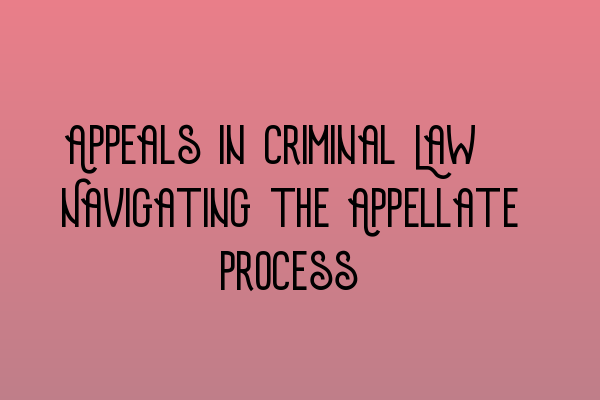Appeals in Criminal Law: Navigating the Appellate Process
At SQE Criminal Law & Practice Law UK, we understand that the appellate process can be complex and challenging. When faced with an unfavorable court decision, it is crucial to have a skilled solicitor who can guide you through the appeals process and fight for your rights.
Before we dive into the intricacies of appeals in criminal law, let’s briefly discuss the importance of SQE exams and preparation. If you haven’t already, we highly recommend checking out our SQE 1 Practice Exam Questions and SQE 1 Practice Mocks FLK1 FLK2 to ensure you are well-prepared for your SQE exams. Our SQE 2 Preparation Courses and SQE 1 Preparation Courses will equip you with the knowledge and skills necessary to excel in your legal career.
The Appellate Process Explained
When a person wishes to challenge a court’s decision, they can pursue an appeal. An appeal is a legal process through which a higher court reviews the lower court’s decision and determines if any errors were made during the trial. The goal of an appeal is to reverse an unfavorable decision or seek a new trial.
It is important to note that not all decisions can be appealed. Generally, only decisions that have a significant impact on an individual’s rights or involve legal errors are eligible for appeal. Therefore, it is vital to consult with an experienced solicitor who can assess the merits of your case and guide you through the appeals process.
Grounds for Appeal
There are various grounds on which an appeal can be based. Some common grounds for appeal in criminal law include:
- Incorrect application of the law
- Misinterpretation of evidence
- Jury misconduct
- Procedural errors
- Insufficient evidence
- Ineffective assistance of counsel
These grounds form the basis for challenging a court’s decision and obtaining a favorable outcome on appeal. As a trusted solicitor, we thoroughly analyze the facts of your case and identify valid grounds for appeal.
Appellate Process Overview
The appellate process typically involves the following steps:
- Filing a Notice of Appeal: This is the initial step, where the appellant notifies the court and the opposing party of their intent to appeal.
- Preparation of Appeal Documents: The appellant, often represented by a solicitor, prepares the necessary appeal documents, including the appellant’s case and legal arguments.
- Oral Arguments: In some cases, the appellant may have the opportunity to present oral arguments to the appellate court. This allows the appellant’s solicitor to elaborate on the legal arguments and emphasize their client’s position.
- Appellate Court Decision: The appellate court reviews the appeal documents, conducts legal analysis, and renders a decision. The court may affirm, reverse, or modify the lower court’s decision.
Throughout this process, having a skilled and knowledgeable solicitor by your side is indispensable. Our experienced team at SQE Criminal Law & Practice Law UK can provide you with the necessary legal expertise and support to navigate the appellate process successfully.
SRA SQE Exam Dates
Before we conclude, we would like to remind you to stay updated with the latest SRA SQE Exam Dates. It is crucial to be aware of the exam schedule to plan your preparation effectively and ensure you are ready for success.
In summary, if you find yourself in a situation where you need to appeal a court’s decision, do not hesitate to seek professional legal assistance. Our team at SQE Criminal Law & Practice Law UK is ready to provide you with expert guidance throughout the appellate process. Remember to check out our SQE 1 and SQE 2 preparation resources to further support your legal career aspirations.
